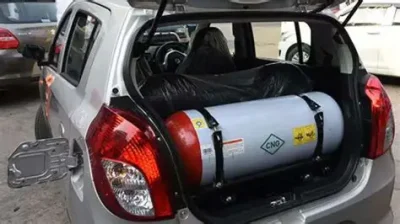
Due to the extra risks involved, owners of vehicles powered by compressed natural gas (CNG) may soon be charged a higher premium for third-party motor insurance.
The premium for third-party motor insurance was recently increased to N15,000, with vehicle owners enjoying compensation of N3 million in the event of an accident. Before the increase, it was N5,000, while the premium for comprehensive motor insurance is between 5 and 10 per cent of the value of a motor vehicle.
Commissioner for Insurance, Olusegun Omosehin, hinted at the likely hike in premiums at the maiden edition of the annual Gas Safety Conference (GSC) in Abuja recently.
Petrol-powered auto engines were prevalent in Nigeria until the increase in the price of petroleum products following the removal of petroleum subsidies in 2023. This is causing an increasing rate of motor vehicle conversion to CNG as vehicle owners attempt to reduce the cost of fueling their vehicles.
However, Omosehin, represented by Ajuyah Omeresan Alfred, the Assistant Director of Special Risk at the National Insurance Commission (NAICOM), during a panel session tagged “Legal and Insurance Risk Management in Gas Deployment, said the CNG-powered engines pose more risks compared to petrol-powered engines.
“The third-party policy may require a review of the rate. I am not saying that there is already a review of the rate for third-party motor insurance, but because CNG brings extra risk into play, there may be a possibility for insurers to look at it again.”
He explained that “when there is a claim, there are some steps that are taken, depending on the magnitude of the loss. We have some professionals, including engineers, who work with insurance companies. We have loss adjusters, who are policy engineers brought in to detect what happened, and who is responsible”.
“When you come to insure any item, the onus is on you to tell the insurance company what you are claiming or bringing on board. So, when there is a fault, all of that comes into play.”
Checks by InsideBusinessNG confirm that peculiar risks associated with CNG-powered automobiles include the potential of fires and explosions when there is gas leakage in the event of a crash or improper installation, particularly if the gas accumulates in a confined space.
As a result, the industrial or modular deployment and use of CNG necessitates strict regulations, proper installation, licensed or certified handling, as well as regular maintenance to minimise potential hazards.
While CNG is generally considered safer than gasoline, the high pressure at which it is stored in cylinders makes it a special risk in any case of emergency or accident.
For instance, CNG storage is strictly carried out using specially designed tanks that contain the gas at a very high pressure, ranging between 200-250 bar, and which have the potential to explode if the tank is damaged or improperly installed.
Another risk factor is that substandard CNG conversion kits or unqualified technicians can increase the risk of leaks and other safety challenges. Overfilling or incorrect installation of the CNG cylinder in motor vehicles can also cause leaks, fires, or even cylinder bursts.
However, industry experts insist that if professionally and properly installed or handled using standard quality materials, CNG remains safer compared to other fossil fuels.
According to Sunday Kanshio, who is the managing partner of Fleissen & Company, a research and consultancy firm with niche expertise in solving infrastructural asset challenges in the energy and other technology-driven sectors, “it has been discovered that some Nigerians install two CNG cylinders in their vehicles, meaning that they are carrying two cylinders in the boots of their cars, which is against the specified standard or code CNG-engine conversion in Nigeria.”
Explaining further, Kanshio stated that “those who behave that way is adding an extra layer of risk to themselves and other people by carrying two explosive devices side by side in a manner that violates the prescribed safety standards in the Nigerian automobile industry”.
Reacting, an insurance broker who preferred anonymity admitted that CNG-vehicles pose more risks than petrol-vehicles but because the adoption of CNG is at an initial stage in the country and insurance operators are still monitoring the claim profile. However, he said “There is no special policy or rating for CNG vehicles in the insurance industry as of today”.
Yet, for insurers, compliance with established safety codes is a precondition for meeting claims obligations to clients, said the NAICOM CEO.
His words: “At the point of assessing what gave rise to that claim, the insurers will want to establish their liability to even pay for the claim at all in the first place. That is why the assessors will be brought in, the loss adjusters are brought in, who are engineers in that particular field, to assess the risk and see what happened and the extent of the insurer’s liability.” (Inside Business Online)

